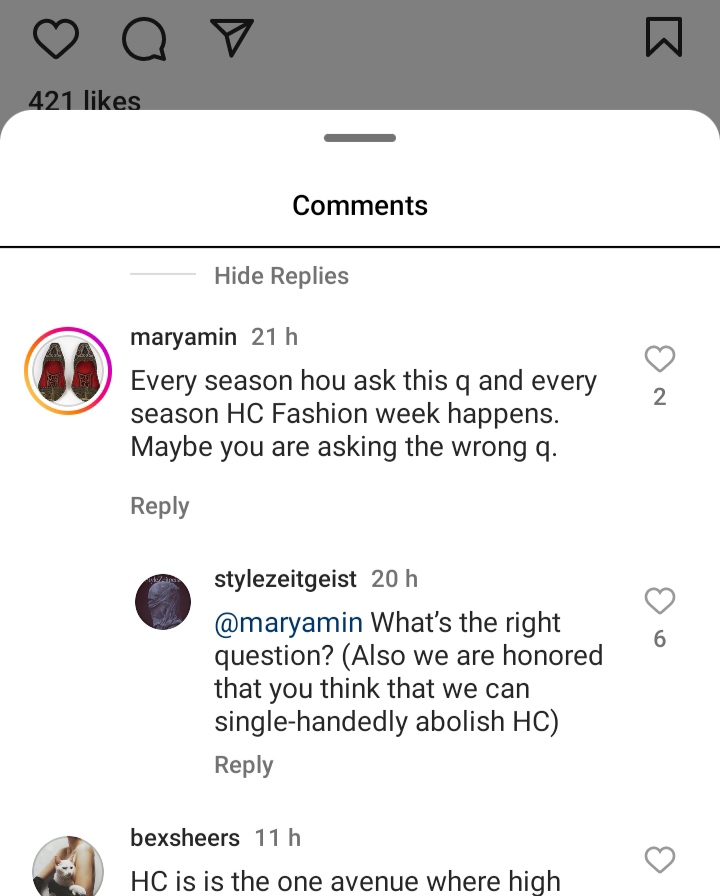LadyJunon
Well-Known Member
- Joined
- Dec 11, 2021
- Messages
- 3,071
- Reaction score
- 5,555
Thoughts?
Source: StyleZeitgeistOP-ED: IS HAUTE COUTURE MODERN?
BY EUGENE RABKIN
JUL 5, 2023
The haute couture week that ends tomorrow in Paris is taking place amidst the riots caused by police killing an Arab youth. In such a setting, showing ultra-expensive clothes to a bunch of ultra-rich women who descend on Paris twice a year for the haute couture week to throw money around felt a bit like the last ancien regime masked ball before the guillotines are rolled out. Only Celine displayed some sensitivity towards Paris, its people, and its own staff and canceled its show. For the rest, evidently, the show must go on.
Blaming fashion for being out of touch with reality is not entirely fair. On some level escapism is fashion’s raison d’etre. Nevertheless, there exists a line between the outside world and the amoral one of fashion, and crossing that line can feel irresponsible, or, at least in terms fashion can understand, distasteful. In times of recent crises, such as 9/11 or the financial meltdown of 2008, luxury fashion and its clientele seemed to understand that, pulling back its most egregious excesses in times of difficulty. Today it seems like that’s no longer the case.
Putting politics aside, watching haute couture shows in today’s cultural milieu still leaves one feeling that it is increasingly irrelevant. Aesthetically, much of it looks anachronistic, a wistful throwback to a world of class division, racial inequality, and conservative morals that hardly feels modern today. One sensed that in the pillbox hats at Alaia, or in the poofy ball gowns at Giambattista Valli.
The feeling that haute couture is out of touch with the wider culture is not new. In the past even some of its most acclaimed practitioners have said so. Yves Saint Laurent declared haute couture outmoded already in 1968, not coincidentally following the students’ riots that rocked Paris. “Recent political events, the reaction of young people to fashion and the way of life today make haute couture a relic of the past,” he pronounced. To YSL the street, and not the insulated couture salons, was modern and relevant, and haute couture was hopelessly bourgeois and insignificant. “First nights at the theater, life on a yacht – all things like that belong to a society which no longer means anything,” he said, “a society which is no longer å la mode.”
The best defense of haute couture is that it serves as the spectacle of skill and craft. And savoir faire, in our increasingly plastic world, deserves our attention more than ever. But much of it has already been translated into ready-to-wear. Thom Browne has been a champion of this movement – his pret-a-porter often looks like couture. Did he really need to go through the effort and the expense of putting on a couture show in which most of the clothes looked like his ready-to-wear? At Dior, Maria Grazia Chiuri was driven by the notions of “apparent simplicity,” and she surely got that right, with half of the clothes hardly deserving the haute couture moniker. The most intricate, handworked pieces she presented, could have easily found their rightful place in one of her regular collections. The same can be said for Schiaparelli, where most of the clothes are so beautifully and intricately made that one can be forgiven for failing to see what goes under haute couture and what does not.
For most brands haute couture has not been economically viable for decades. Its best use has been as image-elevating marketing vehicles to sell bags, perfume, and sunglasses. But there are other successful ways of marketing those goods without engaging in spectacles for the elite that increasingly feel uncouth. Dispensing with the semi-annual couture collections would alleviate the enormous pressure on top fashion designers, and save money, including that of editors and photographers who won’t have to bear additional week’s worth of expenses. And I doubt many will shed a tear for the celebrities and the ultra-rich – surely there are plenty of gated, Instagram-friendly sandboxes they can still play in.
Fashion is about change. What was radical yesterday can look staid today. Coco Chanel’s tweed suits and fake pearls were once the avant-garde, but today they are the marker of sartorial conservatism. Yves Saint Laurent’s ‘60s departure from his hallowed work at Dior scandalized the fashion press, but by the ‘80s he became what he most feared, an out of touch recluse who dressed Parisian society ladies. In the ‘80s Alaia produced clothes that were radical in their sexiness and a hint of kink, before becoming a purveyor of fancy tennis-silhouette dresses to the rich-and-thin Park Avenue set. As sad as that may be, it is also the natural rhythm of fashion. And in that rhythm haute couture no longer feels modern.
AUTHOR: EUGENE RABKIN
Last edited:



